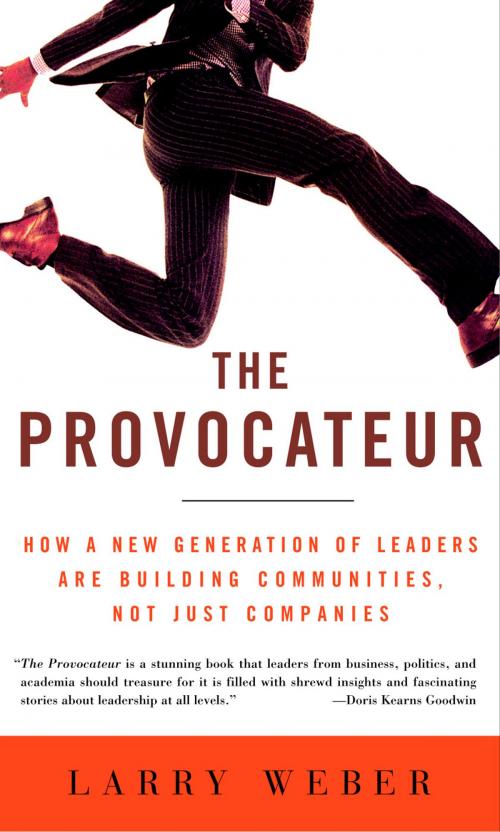The Provocateur
Why Great Leaders are Educators, Entertainers, Sages, and Sherpa Guides, but not Generals
Business & Finance, Management & Leadership, Leadership, Management, Human Resources & Personnel Management| Author: | Lawrence Weber | ISBN: | 9780676806533 |
| Publisher: | The Crown Publishing Group | Publication: | March 26, 2002 |
| Imprint: | Crown Business | Language: | English |
| Author: | Lawrence Weber |
| ISBN: | 9780676806533 |
| Publisher: | The Crown Publishing Group |
| Publication: | March 26, 2002 |
| Imprint: | Crown Business |
| Language: | English |
What’s the difference between CEOs like Lou Gerstner of IBM and Larry Ellison of Oracle? Between basketball coaches Phil Jackson and Bobby Knight? Or media entrepreneurs Oprah Winfrey and Rupert Murdoch?
Gerstner, Jackson, and Winfrey are provocateurs, leaders who are successful not just because they have built a company or an organization, but because they have created a community. Provocateurs are changing both the form and the content of leadership and are in sync with a world being turned upside down by technology, the global economy, and the social landscape.
Success has traditionally been based on command and control, and the model for many leaders was the general who marshaled people and resources to get the product out the door and onto the shelf.
Early in his career, Larry Weber had the opportunity to meet or work with people like Mitch Kapor, the founder of Lotus, and Steve Jobs, the cofounder of Apple. He saw that they were more like the leaders of rock bands (or the directors of theater groups or circus ringmasters), who encourage innovation and individuality. A rock band does have a leader—think of Mick Jagger and the Rolling Stones—but one who promotes the group and encourages individuality. And when a rival band comes to town, it’s not cause for head-to-head competition but an opportunity to increase the size of the pie by creating more fans, or customers, for their genre of music.
Provocateurs think and act differently because they put the customer at the center of everything. They are:
* Educators like Patrick McGovern, who built IDG into a publishing and research powerhouse by empowering his employees to think globally and act locally;
* Entertainers like Jeff Taylor, who managed to build a bond with Monster.com employees and customers through talent and charisma;
* Sherpas like Rick Wagoner, who is guiding General Motors into new territories;
* Concierges like Lou Gerstner of IBM, who believe the product is important but so are customer service, delivery, financing, and every other element. They keep everything running smoothly from check-in to check-out.
So, if someone says, “Your company is like a circus,” Larry Weber wants you to take it as a compliment. After all, who wouldn’t want to be compared with Cirque du Soleil, an organization that combines creativity, artistry, and caring for its people with success and profit. The people running organizations like this circus are provocateurs at the cutting edge of business.
For a free subscription to the Crown Business E-Newsletter, e-mail CrownBusiness@RandomHouse.com. Visit the Crown Business website at www.CrownBusiness.com.
What’s the difference between CEOs like Lou Gerstner of IBM and Larry Ellison of Oracle? Between basketball coaches Phil Jackson and Bobby Knight? Or media entrepreneurs Oprah Winfrey and Rupert Murdoch?
Gerstner, Jackson, and Winfrey are provocateurs, leaders who are successful not just because they have built a company or an organization, but because they have created a community. Provocateurs are changing both the form and the content of leadership and are in sync with a world being turned upside down by technology, the global economy, and the social landscape.
Success has traditionally been based on command and control, and the model for many leaders was the general who marshaled people and resources to get the product out the door and onto the shelf.
Early in his career, Larry Weber had the opportunity to meet or work with people like Mitch Kapor, the founder of Lotus, and Steve Jobs, the cofounder of Apple. He saw that they were more like the leaders of rock bands (or the directors of theater groups or circus ringmasters), who encourage innovation and individuality. A rock band does have a leader—think of Mick Jagger and the Rolling Stones—but one who promotes the group and encourages individuality. And when a rival band comes to town, it’s not cause for head-to-head competition but an opportunity to increase the size of the pie by creating more fans, or customers, for their genre of music.
Provocateurs think and act differently because they put the customer at the center of everything. They are:
* Educators like Patrick McGovern, who built IDG into a publishing and research powerhouse by empowering his employees to think globally and act locally;
* Entertainers like Jeff Taylor, who managed to build a bond with Monster.com employees and customers through talent and charisma;
* Sherpas like Rick Wagoner, who is guiding General Motors into new territories;
* Concierges like Lou Gerstner of IBM, who believe the product is important but so are customer service, delivery, financing, and every other element. They keep everything running smoothly from check-in to check-out.
So, if someone says, “Your company is like a circus,” Larry Weber wants you to take it as a compliment. After all, who wouldn’t want to be compared with Cirque du Soleil, an organization that combines creativity, artistry, and caring for its people with success and profit. The people running organizations like this circus are provocateurs at the cutting edge of business.
For a free subscription to the Crown Business E-Newsletter, e-mail CrownBusiness@RandomHouse.com. Visit the Crown Business website at www.CrownBusiness.com.















